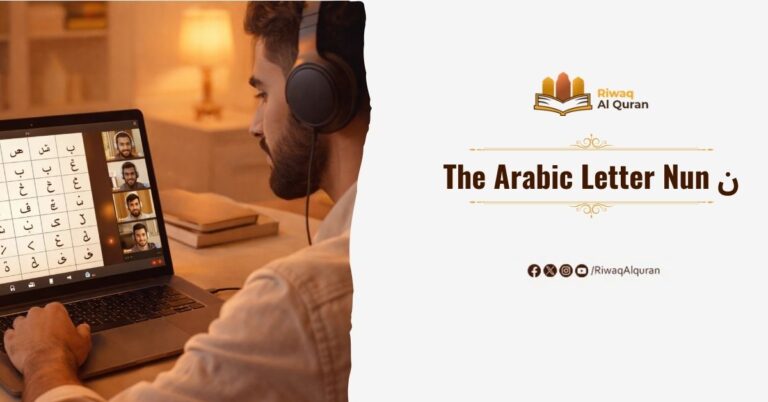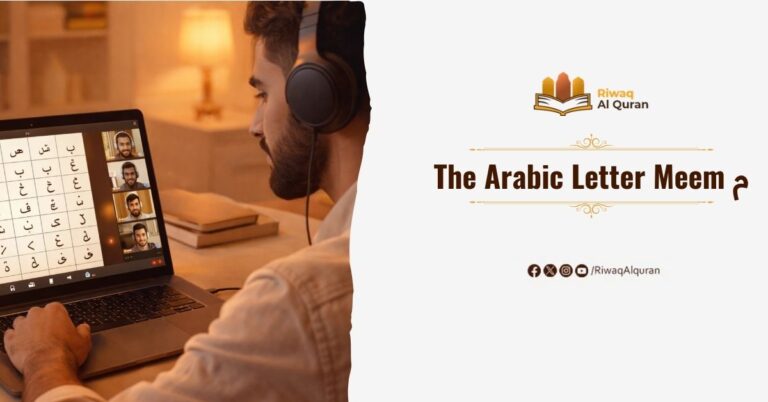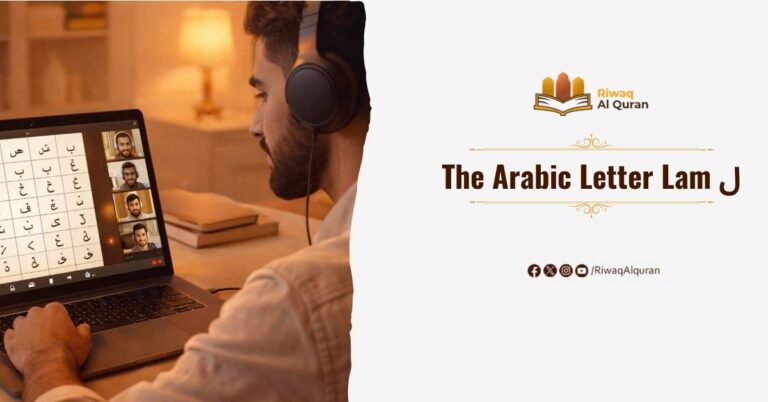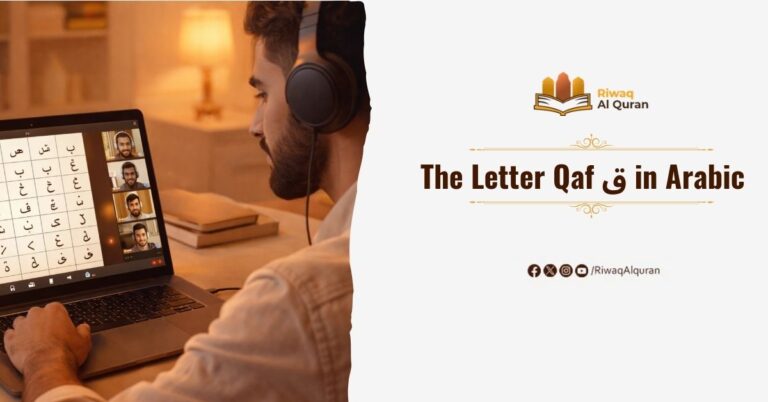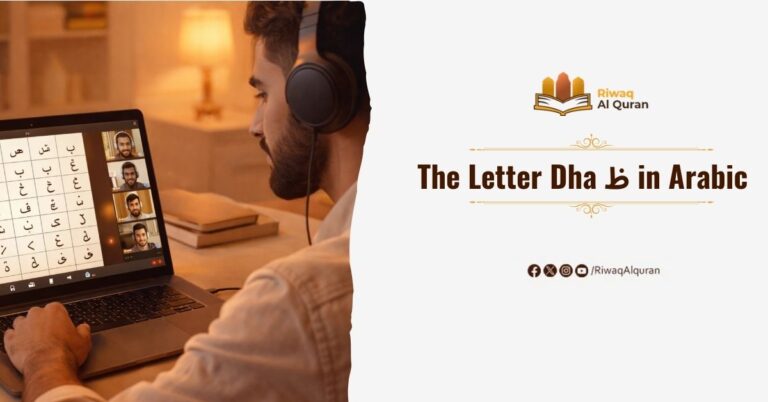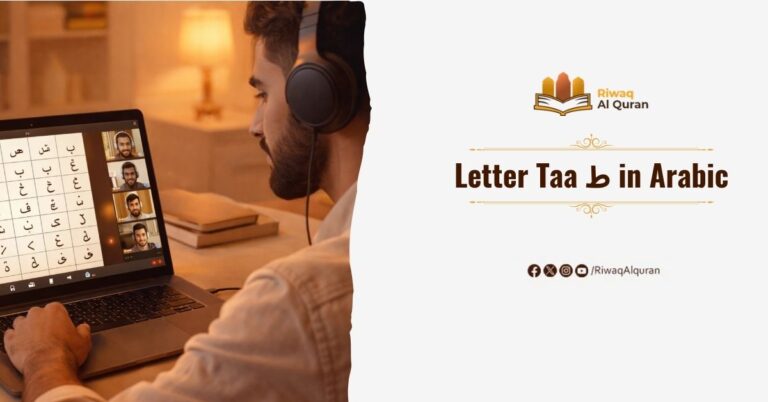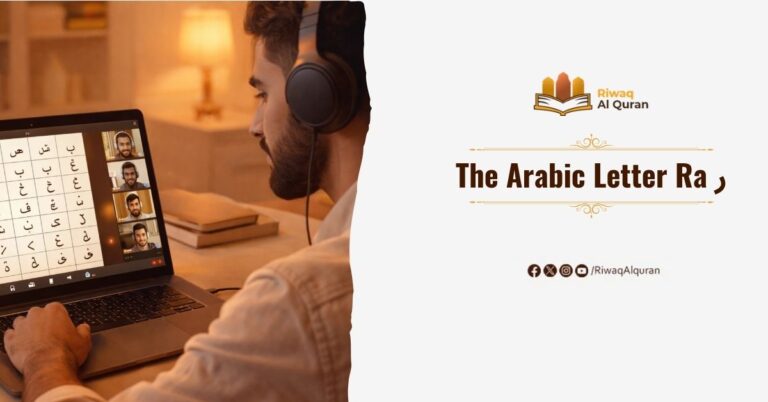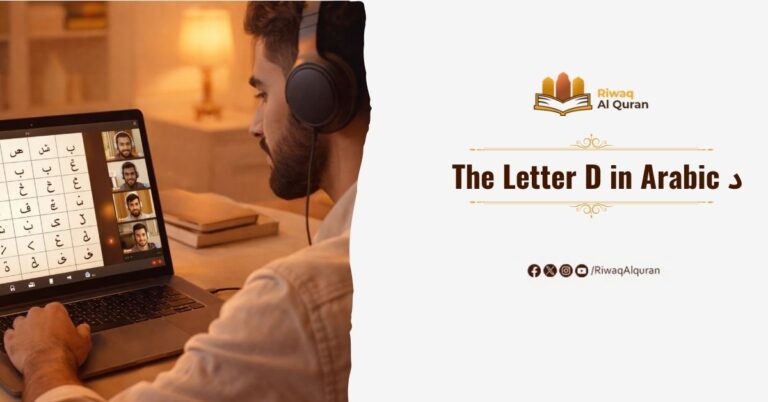“Izhar” is a fundamental concept in Tajweed [the art and science of reciting the Quran properly]. Although “Izhar” is a phonological concept that applies to all spoken Arabic language, it has a special significance in Tajweed. It is important for maintaining the integrity of the Quranic recitation and ensuring that the meaning of the verses is conveyed accurately.
In this article, we will explore the meaning of Izhar as a linguistic term and in Tajweed as well. We will also examine Izhar letters, Izhar rules, and Izhar examples from the Quran. Then, we will tackle the main types of Izhar in some detail.
Table of Contents
What Is Izhar (Idhhar الإظهار)?
Linguistically, “Izhar” (إظهار) means “to make clear” or “to manifest”. As a phonological concept, It has to do with the sound of Noon Sakinah, Meem Sakinah, or Tanween when followed by certain letters. For example, in everyday spoken Arabic language, the verb “ينهون” has Noon Sakinah (ن) followed by هـ, so the Noon (ن) sound is voiced clearly.
In Tajweed, the term “Izhar” refers to the clear and distinct pronunciation of the letters Noon – النون, Meem or the Noon sound of the nunation (التنوين) when they come before certain letters. In these cases, the Noon and Meem sounds are pronounced fully and clearly, without any nasal sound [Ghunnah]. So Izhar means to pronounce Noon Sakinah, Meem Sakinah, or Tanween clearly when they are followed by Izhar letters.
Izhar Letters:
There are 6 izhar letters ء – هـ – ع – ح – غ – خ. If any of these letters comes after the Noon Sakinah – النون الساكنة or the noon sound of the nunation (Tanween), then Izhar ruling is implemented, ensuring that the Noon sound is voiced distinctly without nasalization [Ghunnah]. These letters are:
- ء (hamza)
- هـ (ha)
- ع (ayn)
- ح (haa)
- غ (ghain)
- خ (kha)


The Izhar Rules:
There are some rules of Izhar in Tajweed which are essential for the correct pronunciation of Noon Sakinah, Meem Sakinah, or Tanween. Here are the key rules:
1- To Be Considered For Izhar Ruling, The Noon (ن) And The Meem (م) Have To Be Sakinah:
[Noon Sakinah and Meem Sakinah are those with a Sukon (ْ) above them or with nothing above or under them]. Izhar ruling has nothing to do with the Noon or Meem which have Harakah (not Sakinah).
For example:
“وَأَنَّ هَـٰذَا صِرَٰطِى مُسْتَقِيمًۭا فَٱتَّبِعُوهُ”
Here, this Noon in “أَنَّ” is not Noon Sakinah, as it has Fatha and Shadaa [نَّ] above it. So it is not considered for Izhar ruling.
In comparison:
“قَالُوٓا۟ إِنْ هَـٰذَٰنِ لَسَـٰحِرَٰنِ يُرِيدَانِ أَن يُخْرِجَاكُم مِّنْ أَرْضِكُم بِسِحْرِهِمَا…”
In this part of the verse, the Noon in “إِنْ” is Sakinah and is followed by “هـ” (which is one of Izhar letters), so it has the ruling of Izhar and must be voiced.
2- There Is No Ghunnah In Izhar:
Ghunnah is a nasal sound that sometimes accompanies the sound of the letter Noon (ن) or the letter Meem (م), for approximately two seconds [i.e. 2 Harakat].
Unlike other instances where Noon Sakinah might be pronounced with a nasal sound (Ghunnah), in Izhar, there is no nasalization; it is pronounced purely.
The best way to learn how to pronounce the Noon Sakinah with Izhar, as opposed to other rulings of Noon Sakinah, is to listen to a well-versed Quran instructor to guide and correct you, giving you the proper feedback. You can choose from our experienced mentors at Riwaq Al Quran.
Izhar Examples In The Quran
To check some of Izhar examples from the Quran, it is always advisable to listen to a qualified Quran reciter [such as Shaikh Al Minshawy], as this enhances your ability to understand the Izhar ruling in practice. Now, let’s examine some of these examples.
Example 1:
“إِنَّ ٱلَّذِينَ كَفَرُوا۟ لَوْ أَنَّ لَهُم مَّا فِى ٱلْأَرْضِ جَمِيعًۭا وَمِثْلَهُۥ مَعَهُۥ لِيَفْتَدُوا۟ بِهِۦ مِنْ عَذَابِ يَوْمِ ٱلْقِيَـٰمَةِ مَا تُقُبِّلَ مِنْهُمْ ۖ وَلَهُمْ عَذَابٌ أَلِيمٌۭ”
In this verse, the Noon Sakinah in “مِنْ” is followed by the letter ع (which is one of Izhar letters) in “عذاب”, so the reciter must implement Izhar ruling and pronounce the Noon Sakinah clearly with no Ghunnah.
Example 2:
“أَمْ خُلِقُوا۟ مِنْ غَيْرِ شَىْءٍ أَمْ هُمُ ٱلْخَـٰلِقُونَ”
Again, here in this verse, the Noon Sakinah in “مِنْ” is followed by the letter غ (which is also one of Izhar letters) in “غير”, so the Izhar ruling must be implemented.
Experience Riwaq Al Quran Classes
Watch real moments from our live sessions at Riwaq Al Quran and see how we bring learning to life. These clips highlight our interactive, student-focused approach designed to keep learners engaged, motivated, and actively involved in every step of their educational journey.
Types Of Izhar:
There are four main types of Izhar: Izhar Halqi, Izhar Shafawi, Izhar Mutlak, and Izhar Riwaya. They are somehow different from each other and thus should be studied and practiced. Let’s explore them with some examples from the Quran.
1- Izhar Halqi (إظهار حلقي):
This type of Izhar pertains specifically to Noon Sakinah and Tanween. When either of them is followed by one of the Izhar letters (listed above), they are pronounced clearly as a voiced noon [ن] without any Ghunnah. This is known as Izhar Halqi, named for the fact that its letters are produced directly from the throat.
The Letters Of Izhar Halqi Are 6:
ء – هـ – ع – ح – غ – خ
An Example From The Quran:
“تَصْلَىٰ نَارًا حَامِيَةًۭ“
Here, the Tanween in “نَارًا” is followed by ح (which is one of Izhar letters), so the Noon (ن) sound is voiced.
2- Izhar Shafawi (إظهار شفوي):
This type of Izhar relates specifically to Meem Sakinah. When Meem Sakinah is followed by any letter other than Baa (ب) or Meem (م), it is pronounced distinctly as a voiced Meem [م] without Ghunnah. This is known as Izhar Shafwi, named for the fact that it is articulated using the lips.
An Example From The Quran:
“وَٱلْأَنْعَـٰمَ خَلَقَهَا ۗ لَكُمْ فِيهَا دِفْءٌۭ وَمَنَـٰفِعُ وَمِنْهَا تَأْكُلُونَ”
The word “لكم” ends with Meem Sakinah (م) and the following sound in the next word “فيها” is ف, so the Meem (م) sound is voiced.
3- Izhar Mutlak (إظهار مطلق):
This type of Izhar pertains solely to Noon Sakinah and Tanween. It occurs in just four specific words in the Quran.
1- الدنيا (only when it begins with الـ)
2- بنيان
3- صنوان
4- قنوان
Although both ي and و are letters of Idgham (ي ر م ل و ن), Idgham is not permitted in these four words because doing so would alter their meanings. This is referred to as Izhar Mutlak (absolute), as all Ten Recitations (القراءات العشر) of the Quran unanimously agree on this practice.
4- Izhar Riwaya (إظهار رواية):
This type of Izhar pertains to Noon Sakinah only. It is known as Izhar Riwaya [narration] because it is applied only in certain instances of the Hafs narration (رواية حفص) [Hafs is one of the most widely used recitations of the Quran]. It appears in just two words in the Quran.
“يسٓ ١ وَٱلْقُرْءَانِ ٱلْحَكِيمِ”
Here, the Noon is voiced according to Hafs narration.
“نٓ ۚ وَٱلْقَلَمِ وَمَا يَسْطُرُونَ”
In this verse also, the Noon is voiced according to Hafs narration.
Read more about: Ikhfa, Idgham, Izhar, And Iqlab With Examples


Why Students Love Learning with Riwaq Al Quran
Hear directly from our students about how Riwaq Al Quran Academy has transformed their connection with the Book of Allah. Their experiences reflect the dedication, care, and quality that guide every step of our teaching.
Learn Quran, Arabic And Islamic Studies Online With The Best Native Tutors
Riwaq Al Quran is a comprehensive online platform that offers personalized Quran, Arabic and Islamic Studies Online classes for individuals of all ages and backgrounds.
Their experienced instructors use a structured curriculum to cover Tajweed, Tafsir, and Memorization, providing easy and effective access to learning the Quran.
The advanced online classes allow for seamless communication and interaction between students and teachers. Join Riwaq Al Quran for a deeper connection with the Quran.
We offer several courses such as:
- Online courses for kids.
- Online Quran classes for kids and adults.
- Online Arabic courses
- Online Ijazah courses
- Online Islamic Studies courses.
Here are a sample of our set of Quran Courses that will be helpful for you:
- Online Tafseer Course: Delve into Quranic meanings with our insightful online Tafseer course.
- Noorani Qaida Online: Learn Quranic basics efficiently through our Noorani Qaida online program.
- Online Quran Recitation Course: Enhance Quranic recitation skills through our expert-led online course.
- Online Tajweed Classes: Master Tajweed rules for beautiful Quranic recitation in online classes.
- Quran Memorization Online Course: Memorize the Quran effectively with our specialized online memorization course.
- Online Qirat Course: Explore diverse Qirat styles with our comprehensive online Qirat course.
- Online Quran Classes for Kids: Nurture a love for the Quran in kids through interactive online classes.
Conclusion
To sum up, mastering Izhar is essential for anyone seeking to recite the Quran correctly. Izhar plays a crucial role in the phonology of Arabic words, and this acquires a special significance in Tajweed. So understanding and implementing it properly are essential for accurate Quran recitation.
A Muslim cannot recite the Quran properly without studying Noon Sakinah rules [Izhar being one of them] very well. By following Izhar rules, reciters can maintain the integrity of the pronunciation and meanings of the verses. It is a journey that needs much deduction and patience. However, the result is definitely well-deserved.



























